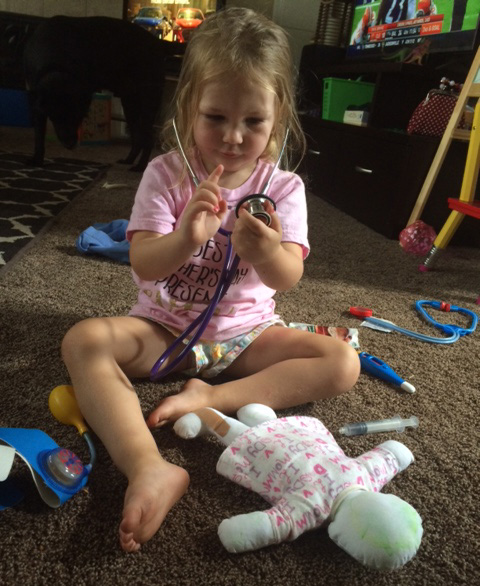By day she wears heels and a dress. At night, Jordan Pearsall wears scrubs and clogs. And when she goes to her locker to change, she sees a picture hanging on the locker door that reminds her of the inspiration behind her professional path.
The picture is of Pearsall’s father, Greg Doring, 65, recipient of a kidney transplant.

She started her career as a ballerina, receiving an undergraduate degree in dance education. But as she saw her father’s health decline, a result of renal failure, Pearsall decided she needed to prepare for his care.
“I saw how hard my mom worked as a nurse and at first I thought it wasn’t for me. There can be a lot of stress. It’s tough but it can also be rewarding,” said Pearsall, 35, and the eldest child of Greg and Joanne Doring. “I felt like I needed to be there in case anything ever happened to my mom.”
So a decade after she began teaching dance, she returned to school and obtained her nursing degree. Months after she started, her father received a kidney transplant.
Originally from Maryland, Pearsall worked at an Annapolis hospital in OR and trauma before coming to IU Health. She became a transplant coordinator two years ago, and is coming up on her seventh year with the transplant surgery team.
“The days can get long and hard. I keep pictures in my locker and at my desk of my dad. It reminds me that if that team hadn’t been there, my dad may not be here. He got to see both my brother and I get married and he’s here for his grandkids,” said Pearsall.
Her move to Indianapolis isn’t a complete surprise to Pearsall’s family. When she was in nursing school she completed a scholarship application offered by IU Health that landed the hospital on her radar.
“I wanted to work in OR transplant because we are one of the only hospitals that has a dedicated OR transplant team. Other centers have adopted this model but at the time we were it,” said Pearsall, who is married to Mike Pearsall. They have one daughter, Alexandra, 3.
 “She’s very much a child of a transplant nurse,” said Pearsall of her daughter. “She knows when I’m on call and pretends she’s on call. She gets out her doctor kit and starts working on her doll. I’m a coordinator during daylight hours and I’m on call for OR at night. I live and breathe transplant.” As a transplant coordinator, she has about 80 adult and pediatric patients in her charge – helping them understand how they got to the point of transplant and keeping them healthy and on track to getting a transplant.
“She’s very much a child of a transplant nurse,” said Pearsall of her daughter. “She knows when I’m on call and pretends she’s on call. She gets out her doctor kit and starts working on her doll. I’m a coordinator during daylight hours and I’m on call for OR at night. I live and breathe transplant.” As a transplant coordinator, she has about 80 adult and pediatric patients in her charge – helping them understand how they got to the point of transplant and keeping them healthy and on track to getting a transplant.
“I think I can connect closely because of my background. I tell them ‘I know you are scared’ and I tell them that I take OR calls and there’s a good chance I will have them in OR,” said Pearsall, as she describes the full circle of her caregiving. She works about 100 OR call hours every six weeks. “It’s a unique position and is a good balance because I get to see the happily-ever-after. I know the struggles either as a coordinator or during surgery. I don’t get lost in the day-to-day stress because I have to hold onto the hope that we are part of a team not just for the patient but the whole family. We see them all life. We tell them this is a marriage and there is no divorce. We’re going to be together for the long haul.”
Knowing her patients inside and out is a career opportunity that Pearsall only dreamed about when she went into nursing.
“This is my passion. There have been such a series of events and I feel like this is what I should be doing, but I couldn’t do this without my husband. He and Ally have to share me with my patients but he allows me to do this because I can help so many people. We both remember how sick my dad was and now we see how far he has come – because of a transplant and a great team to care for him.”
And what about dancing?
She recently started taking lessons with her daughter.
“My brain still thinks I’m a young dancer, but my body says I’m a busy 35-year-old nurse.”
— By T.J. Banes, Associate Senior Journalist at IU Health.
Reach Banes via email at T.J. Banes or on Twitter @tjbanes.
